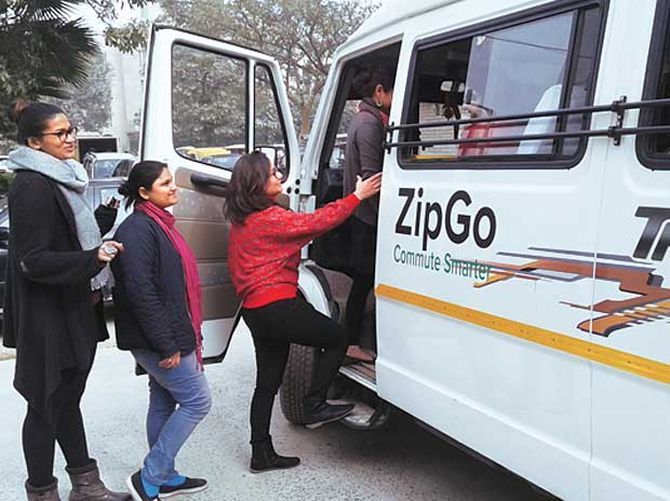Mass mobility in India is in a race when the light turns from yellow to green. Just that this moment has lasted three years. The renewed enthusiasm, however, indicates that the lights may finally be about to change, says Patanjali Pahwa.

Last week, something slipped under the radar. Indian company Commut was acquired by Dubai-based ride-hailing unicorn Careem.
There was not even an eyebrow raised and barely any newspaper covered it. Truth be told, there was hardly any cash involved in that deal.
Careem was essentially picking over the bones of a company that had shuttered. The Dubai-based company took the team and the tech. Gurugram-based Shuttl took on the operations and the employee database.
What is Commut? It is a bus aggregation service. A company that functions just like Uber and Ola but it aggregates buses and exists on the fringes of Indian mobility.
But let’s go back to Careem. Why does Careem want Commut? It was to unveil a mass mobility platform in West Asia and North Africa.
The economics in this business is attractive. The per seat cost is low, the fuel price is low and the demand at certain hours is extremely high.
It is a business model that is bound to find traction in West Asia. But, it hasn’t in India.
A few green shoots, however, are visible now. In August this year, Bengaluru-based company, Zipgo, announced a round where it raised Rs 300 crore led by Essel Green Mobility Limited, which is under the Essel Group that is led by Subhash Chandra.
This investment did raise eyebrows. The 67-year-old Rajya Sabha member has not been active in start-ups as an investor. But he was interested. And there is a reason.
Currently, Zipgo is in six states. “I can’t tell you which cities,” said co-founder and CEO Jitender Sharma.
“Competition is too tight.” Sources in the sector say that the company records between 5,000 and 10,000 rides a day.
The competition that Sharma is paranoid about is Shuttl, which records almost 40,000 rides a day.
Looks small? Yes, it is approximately one eighth of the Ola and Uber ride numbers.
But as traffic increases and fuel prices continue to spiral, customers will start to look for cheaper options.
Here the costs come down to Rs 3 to Rs 5 a kilometre. Each ride of a bus breaks even at 80 per cent capacity. Which means 30 passengers.
The economics are easy to achieve. “The challenge comes in aggregating demand,” says Sharma.
And that’s where the scale of this business flexes its muscles. The ride numbers then start to look interesting.
It may not be a winner- takes-all market, but this sector has the potential to dwarf the ride-hailing unicorns by the sheer volume of customers ferried from one place to another.
There is certainly demand. But despite the upside, there are only a few companies in this sector.
About two years ago, Zipgo was forced to shutter its operations temporarily in Bengaluru when the company did not have the right licences.
“I don’t want to talk about it, you can write if you like,” said Sharma.
The company was deemed operating under the wrong licences and the police forced Zipgo to withdraw its operations from the city.
That isn’t to say the company has left the city. It is still around, operating in the background in a slightly different way.
Zipgo’s competitor, Shuttl, also has its own set of problems.
It got into a tiff with Ola back in 2015 when the Bengaluru-based unicorn took up the name Shuttle for its bus service.
Both sides alleged driver poaching and claimed first right to the name. Nothing came of it.
In early 2018, Ola shut its bus operations to focus on cabs. Shuttl, too, has found it difficult to grow, especially in cities such as Pune, where it tried everything, including B2B, and still couldn’t get any purchase.
The problem plaguing both companies is licences. There are two types of licences in Indian states - state carriage and contract carriage.
State carriage means the company can pick up and drop passengers along a fixed route.
Passengers can hail the bus down at designated stops. State governments don’t give these away.
The state city transport bodies enjoy a near monopoly when it comes to these licences.
Contract carriage licences are granted for a pre-existing contract between a customer and the company.
Both have knowledge of each other and the contract is made before the ride starts.
“It is what we do,” says Sharma. His company operates in Mumbai, Hyderabad and Bengaluru, among other cities.
There is a subtle difference between the two licences. But there exists a grey area.
Let’s assume a bus goes from point A to point B. Before the bus starts from point A, if a customer buys a ticket to be picked up from a point between the point of origin and destination, it is technically doing the same job as a state carriage. That explains Zipgo’s secrecy.
Set up in 2015, Zipgo has the capital to grow beyond six states but current laws stand in its way.
“It is good to read the tea leaves,” says a policy professional at one of the two ride-hailing companies in the country. “Why would Chandra invest in a company that is stuck in a policy quagmire?”
There is a Bill stuck in the Rajya Sabha. The draft Motor Vehicles Act, which mandates that private organisations can compete with city transport services.
It also waives licences needed for electric vehicles that serve as public mass transit options.
If cleared, the regulations could open up opportunities for new players in mass transit, something the states have been resisting.
But if the Bill goes through, start-ups will be able to offer a viable alternative to the ageing bus services that have not been able to keep up with demand in the metros.
And the sheer number of people in India means there is enough room for both types of commuter service to co-exist.
Mass mobility in India is in that brief moment in a race when the light turns from yellow to green. Just that this moment has lasted three years.
The renewed enthusiasm, however, indicates that the lights may finally be about to change.
Photograph: Kind courtesy, Business Standard












 © 2025
© 2025